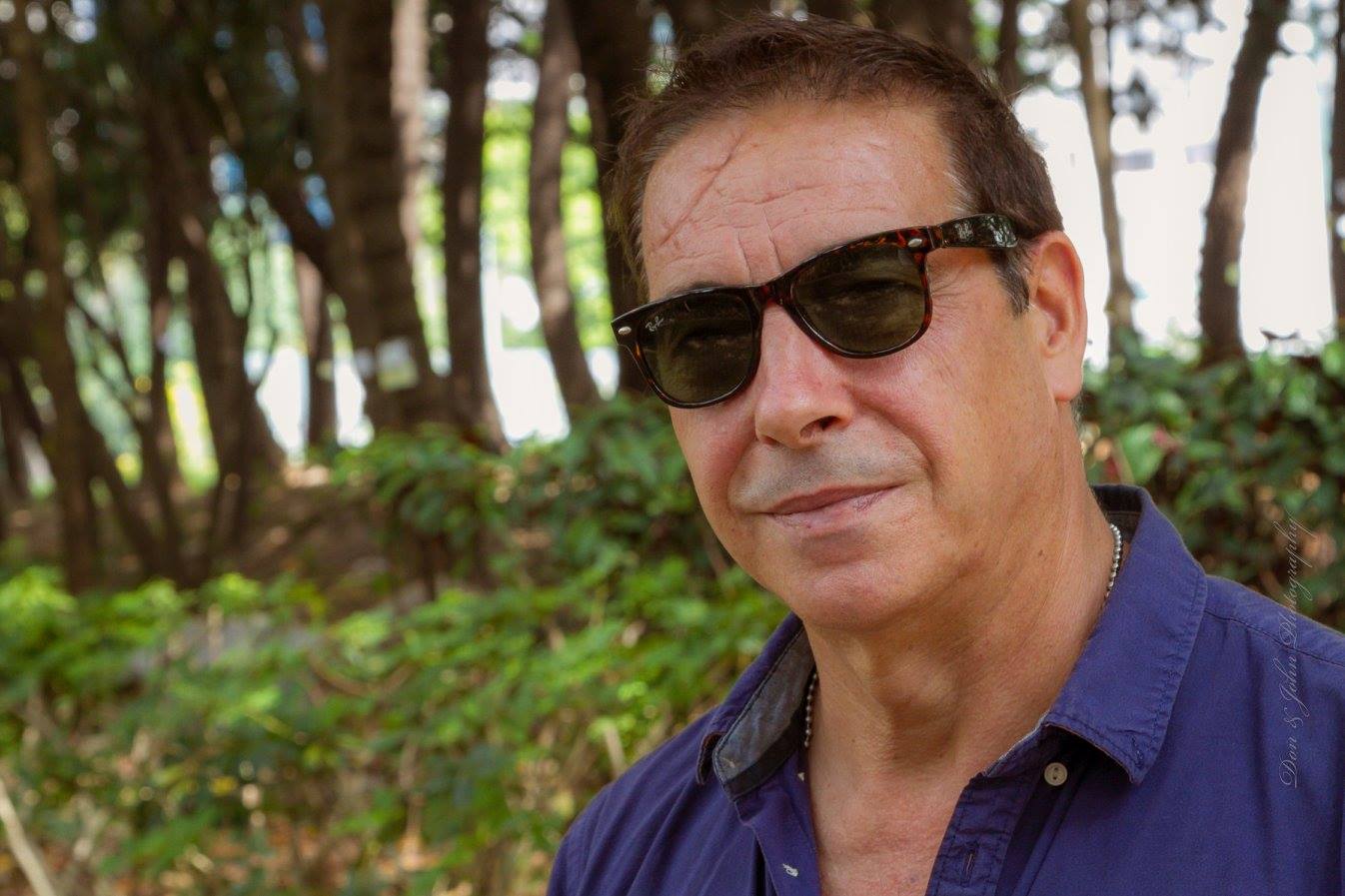Entretien avec
Romano Kristoff
Existe aussi en Version Française
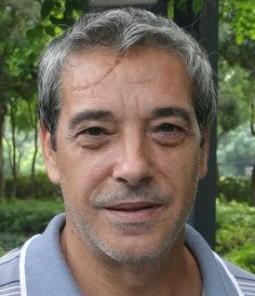
Introducing Romano Kristoff, the most enigmatic figure of Filipino actioners. An adventurer and a fighter, both in movies and in real life. A former soldier in the Légion Etrangère who turned into a Rambo look-alike in films shot at the end of the world, whether in North Korea, Cameroon or the Philippines. After the severe decline of the film industry in Manilla, Romano seemed to vanish and many people started to wonder what had happened to him. Some said he was on a mission abroad, others believed he was in hiding or on the run, some rumors even claimed he got killed by gang thugs, but we can now testify he continues to be in great health and enjoying the life of a debonair gentleman. He kindly agreed to answer our questions about his life and career in cinema.
Interview conducted in June 2020 by John Nada
We have interviewed many of your colleagues, and know quite much about the movie industry in the Philippines now. What we don’t know much about is… you! So, who is Romano Kristoff?
Romano Kristoff is just a screen name. My real name is Francisco Xavier Garcia Peña. I was born in 1951 in the city of Segovia, Spain. When I was 11 years old, my parents moved to Barcelona. At the age of 16, I felt the need to know the world, and started traveling around Spain: Mallorca, Canary islands, Malaga, Madrid, then Germany etc., working as a DJ in some of Spain famous discos of the time. At 21, I joined the foreign legion for 3 years, in North Africa.

In the Legion, they don’t ask questions about your past. Many choose it to escape from a bad situation, and start anew. Was it your case, or did you just want to travel and see the world?
In the Legion there were 4 types of people: 1 the professional soldiers, 2 the ones who were escaping from the law, 3 the broken hearted, and 4 the ones looking for adventure. That was my case.
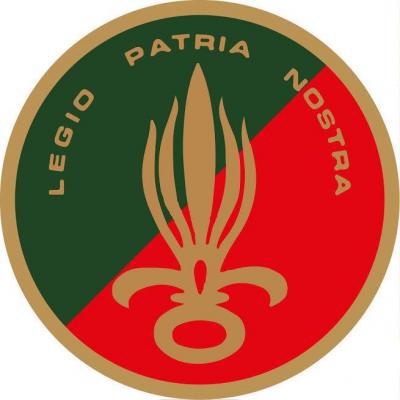
How did you end up in the Philippines?
After serving in the Legion, a Spanish-Filipino agent got me into modeling in Spain and Germany. It is him who chose Romano Kristoff as my artistic name, simply because he thought it sounds very good. Later on, he convinced me to go with him to the Philippines. I went there in 1976, mid year. Once there, I started to have many contracts as a commercial model, over 500 print acts, and about 50 ramp modeling for the famous couturiers of the time, local and foreigners.

We heard you first started to act not in movies but in plays, for the Spanish speaking community in the Philippines. Is that right?
Well, not in this order. As I said I started first as a model, then in the late 70’s I met Bill James Haverly, a friend of Don Gordon, who would become my agent. It’s only after Bill became my agent that I started to do small parts in Filippino movies. One was Ambiciosa by director Joey Gosiengfiao I think, another one was directed by Elwood Perez but I don’t remember the title, another one was Ano ang ginawa an babae sa ibon ? (What did the girl do with the bird?, 1980) from director Arthur Nicdao… Anyway, in 1980 I was approached by a Spanish theater director living in the Philippines, who was in the Phil-Hispanic Theater Group. He convinced me to do theater with him, which I did for 6 or 7 years. Until he went back to Spain and I took over as actor, director ans set designer, doing plays in between my films for another 6 or 7 more years.
After a few small parts, you got your first breakthrough in Bruce's Fist of Vengeance, a Kinavesa production in which you got to play « Miguel », the main bad guy…
Yes, one day Bill James tried my skills in martial arts, combat, military, etc. A few days later, he offered me the part in Bruce's Fist of Vengeance, that he directed.
 Romano Kristoff facing Bruce Le (Huang Kin-lung) in "Bruce's Fist of Vengeance" (1980).
Romano Kristoff facing Bruce Le (Huang Kin-lung) in "Bruce's Fist of Vengeance" (1980).
Could you tell us a bit about your martial background?
I did karate, a Japanese style called Shukokai, in Spain during the early 70’s, then when I arrived in the Philippines I did taekwondo, and in 1980 I started Uechi-ryu Okinawan style with Robert Campbell up to now, where I hold a 6 degree black belt.
You had a fight scene against Bruce Le at the end of the movie, using nunchakus. In your opinion, was Bruce Le a serious martial artist, or just mimicking Bruce Lee and basically doing « cam-fu »?
Well, I don’t like to talk about what other actors do or do not, I respect everyone, but martial arts for me is a part of life, in my case it represents honor, discipline, humility, character and compassion.
 Don Gordon Bell and I (on the left), with George Mattson and our Sensei Robert Campbell. This photo was taken in 1980 at the Manila Polo Club Children Pavilion, before we moved to the main dojo. Robert Campbell, a 10 dan in Uechi-ryu, is not only my teacher, he is my dear friend and brother. »
Don Gordon Bell and I (on the left), with George Mattson and our Sensei Robert Campbell. This photo was taken in 1980 at the Manila Polo Club Children Pavilion, before we moved to the main dojo. Robert Campbell, a 10 dan in Uechi-ryu, is not only my teacher, he is my dear friend and brother. »
After that, you worked a lot for K. Y. Lim (Kinavesa / Silver Star) but never for Cirio H. Santiago (Premiere Productions). Any reason for that? Did you have sort of an exclusive contract with Mr. Lim?
Well I did, at the beginning, work in one of Cirio’s films. The movie was Firecraker, and I had only a very small part. Cirio was a friend and offered me parts in other films, but I thought at that time that the parts were not good enough. Regarding Lim, he was the first to give my break, and I always respected him and was grateful for it.
 Romano in Cirio Santiago's "Fireracker" a.k.a. "Naked Fist", in 1981.
Romano in Cirio Santiago's "Fireracker" a.k.a. "Naked Fist", in 1981.
Is it true that Bruce Baron, Mike Monty and a few others made some sort of an informal pact, that none of you would work for less than US$2,000 for a lead in one of K. Y. Lim's films?
Yes, as you know they were exploiting us, so one day I called some of my lead actors friends and we decided that enough was enough, that we would not work for less than that.
After you met and worked with Richard Harrison in the Philippines, he invited you to make Three Men on Fire (a.k.a. Terror Force Commando) with him and Alphonse Beni in Rome and Cameroon. You even co-wrote the script and helped to direct…
Yes, I have a great respect for Richard and his whole family. Working in Cameroon was a good experience, and it was wonderful to work with Alphonse.
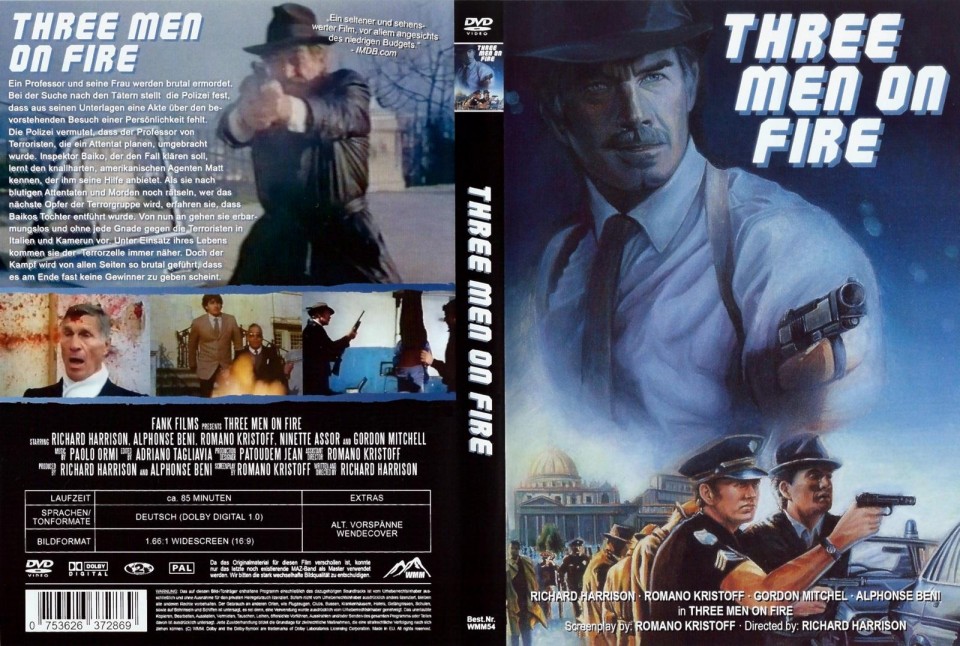
Sebastian Harrison told us about the shooting of this scene in Three Men on Fire, where you had to run with a gun in your hand in a real market, and people didn't know it was a fake gun, and they would yell and throw things at you…!
It was really something. When I arrived on the set, I did not see any cameras, so I asked, and they told me that they where hidden because they did not want people to block them. Anyway I, as the bad guy, was supposed to run across the market, pushing everything in front of me, so that’s what I did. And people yelled and started chasing me, throwing me all kinds of vegetables and holding knives and machetes. I really thought it was part of the movie until I got to the end of the market and an angry crowd surrounded me. At that point I had to point my gun to them to hold them back. Good thing the police arrived and told them we were shooting a movie and I was the bandit in the film. From then on, I was known in Cameroon as « Monsieur le bandit ». January 1986, shooting of "Three Men on Fire" in Cameroon. From left to right: Joseph Takam (assistant camera), Romano Kristoff, Jean Roke Patoudem (actor and art director).
January 1986, shooting of "Three Men on Fire" in Cameroon. From left to right: Joseph Takam (assistant camera), Romano Kristoff, Jean Roke Patoudem (actor and art director).
You did several films with Italians, what memories do you have of working with them? Was it different on the set than working with Filipino crews?
Not much difference in terms of shooting. Of course Italians had more experience, but what really makes a film better or worse in the end is the budget. As you know, with a better budget you can get better professionals, better equipment, a better post-production etc.
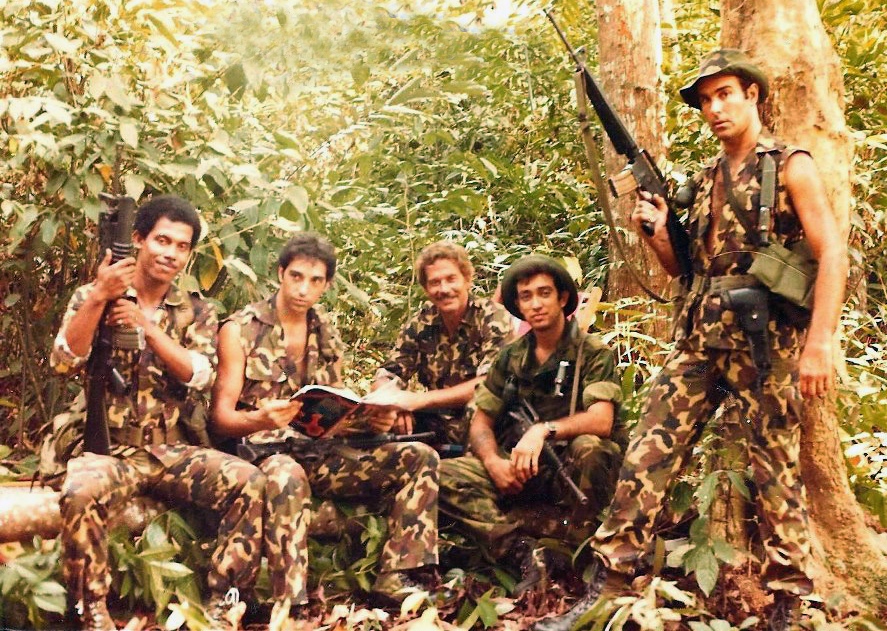 From left to right: Jim Gaines, Romano Kristoff, Richard Harrison, Don Gordon Bell and Michael James during the shooting of "Rescue Team" (1983).
From left to right: Jim Gaines, Romano Kristoff, Richard Harrison, Don Gordon Bell and Michael James during the shooting of "Rescue Team" (1983).
After Three Men on Fire, we know Richard Harrison encouraged you to try your luck in Italy. He told us « I tried to get Romano to leave Manila as he had looks and talents (…) I will never understand why he didn’t get out of the Philippines ».
Yes I did. In fact in 1990 I went to Madrid, and I arranged things with my film godmother Imperio Argentina, my film godfather Luis Escobar Kirkpatrick, Marquess of las Marismas del Guadalquivir, TV producer Elías Querejeta, and Damián Rabal as my agent to help me in Spain. They gave me a hommage in Marbella as the youngest Spanish actor who was working more abroad. Unfortunately, in February 1991, Luis Escobar died, and in July of the same year Damián also died, so I was frustrated. I decided not to go to Spain anymore. Instead I opened a small film company, with a Japanese friend of mine by the name of Hiroshi Akanoma, and did some documentaries for Japan. [Nanarland: Hiroshi Akanoma had a Cie named Rodeo Motion Picture, he notably co-produced Blowback: Love and Death, with Mike Monty as the villain. You can learn more about this character, who took his own life in 2002, in this interview with scriptwriter Mike Cassey, conducted by Andrew Leavold]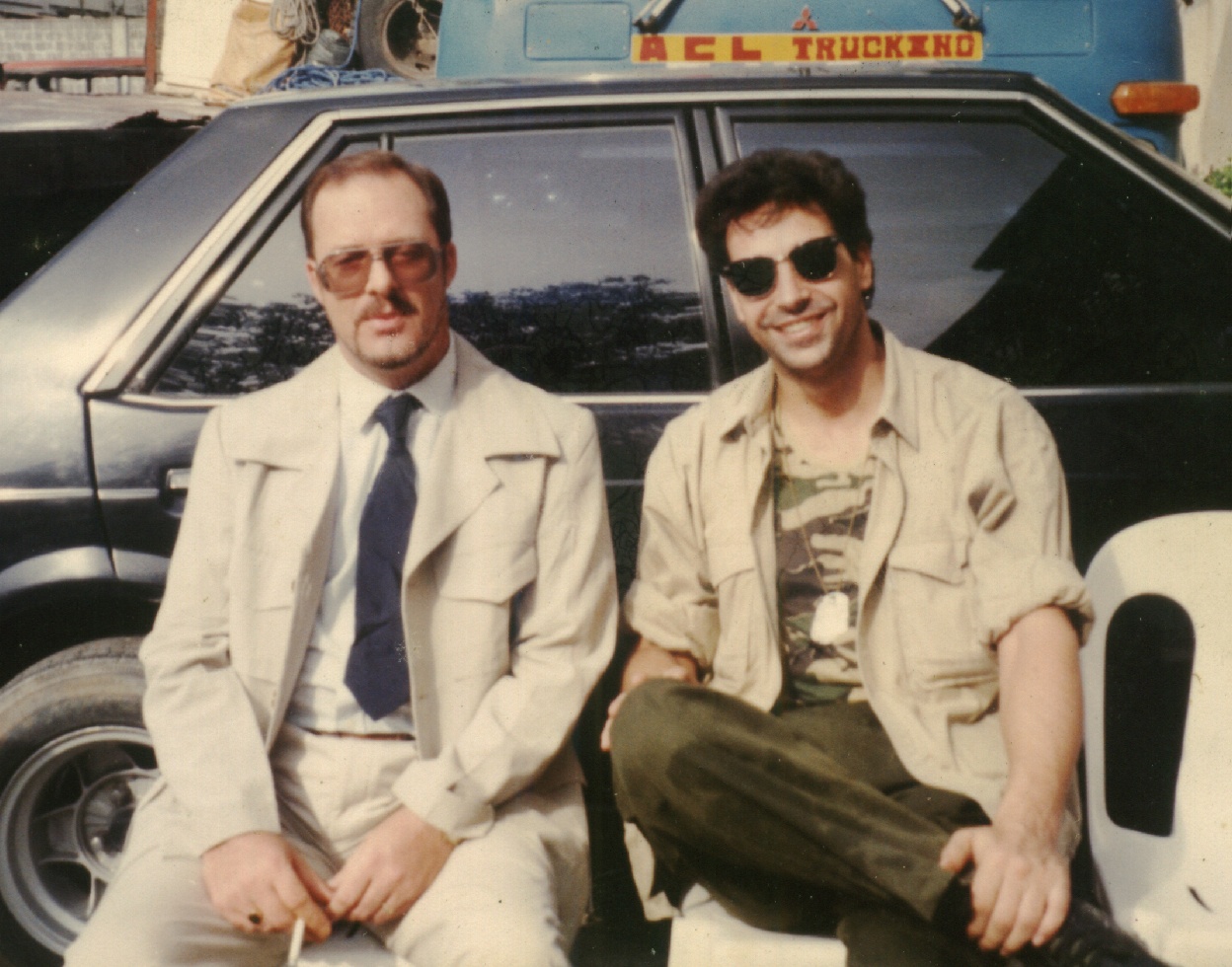 Mike Cassey and Romano Kristoff (courtesy of Mike Cassey and Andrew Leavold).
Mike Cassey and Romano Kristoff (courtesy of Mike Cassey and Andrew Leavold).
Speaking of Japan, our Spanish colleague Jesús Manuel Pérez Molina found overthere two erotic movies, with you and other guys from Kinavesa in it. Both are titled Manila Emmanuelle, were produced by Ken Watanabe (Japanese screenwriter not to be confused with his namesake, famous actor seen in The Last Samurai or Godzilla) and shot in the Philippines. They were apparently released in 1995 on the Japanese video market only.
During the 80’s, I was the one who lent Ken Watanabe the money to establish Watanabe Film. In 1988 we shot Sando and the Diplomat's Daughter, in 1989 we shot a war movie named Above the War (a.k.a. The B-Team) with Richard Harrison and Kurata Yasuaki, and then these two erotic films. Ken and I were like brothers, until he betrayed me in 1991. The last film I did with him was Harimao, on which I was coproducer and also in charge of the shooting schedule. I really got mad at him because he became too greedy and wanted everything for himself. I left Watanabe Film and years later, he came to ask for pardon. He was diagnosed with cancer and shortly left for Japan. Later, I was told he had died. I didn’t know those erotic films had been released in Japan. Watanabe probably shelved them for years, till he sold them to Toei. Back then, I thought they were just a lost investment, and didn’t get a penny.
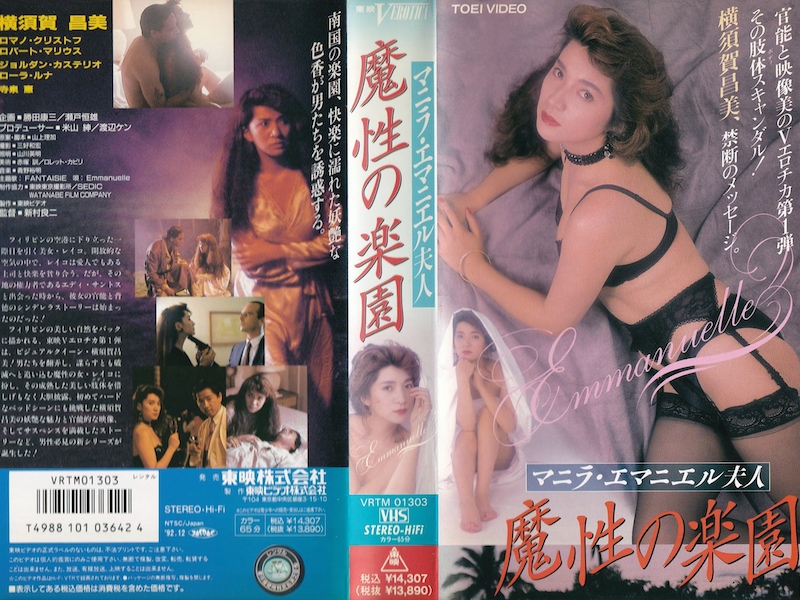 "Manila Emmanuelle's Magical Paradise", which was followed by "Manila Emmanuelle's Dangerous Paradise".
"Manila Emmanuelle's Magical Paradise", which was followed by "Manila Emmanuelle's Dangerous Paradise".
We know the stunt work and general shooting conditions could sometimes be dangerous in Filipino action films. Would you have any personal anecdotes about it?
I did a film for Dick Randall, an American producer living in Italy and London. It was called Horror Safari, with Stuart Whitman, Edmund Purdom, Woody Strode, Harold Sakata, Glynis Barber and Laura Gemser. I was assistant director and fight choreographer. We were shooting in the Pagsanjan river with a 6 meter long crocodile, two ropes tight to his neck, to control him and keep him at the center of the river. But the croc wasn't too happy about that, he started to turn around and with the ropes, he entangled himself upside down. What to do? We could not shoot, and there was no one there to do anything. So here goes the stupid Romano walking into the river. While everybody was shouting don’t do it, get out of the river, I got to the croc, removed the ropes, turned the croc right and he was ok, and obviously grateful.

Another time, we were shooting Bruce's Fist of Vengeance, and there was that scene were I’m supposed to jump from the top of a roof onto a lower roof. So I asked Bugsy Dabao, the assistant director, please check if the roof is strong enough. He checked, came back and, supposedly, said « don’t jump ». But the « don’t », was not hard enough so I only heard « jump », and I did jump. And of course I went through the roof.
With Watanabe Film, we made a movie for the Japanese called Harimao, the tiger of Malaysia. A big Siberian tiger was needed for the shooting, so we moved a 350 kilos female tiger to the Pagsanjan jungle. We let the tiger and two small cubs for a few days there, to acclimate and feel the area. When the shooting was over, the tiger refused to get into the track. No one would do anything to help, so the owner of the tiger asked me to jump into the big cage and help him. And there goes the idiot Romano again, jumping into the cage. The owner of the tiger started to pull the tiger, with a chain tied to its neck, while I was pushing the tiger from its ass. But the reluctant tiger made a strong pull, and the owner felt down. The tiger turned around, looked at me, made a big roar… and walked away.
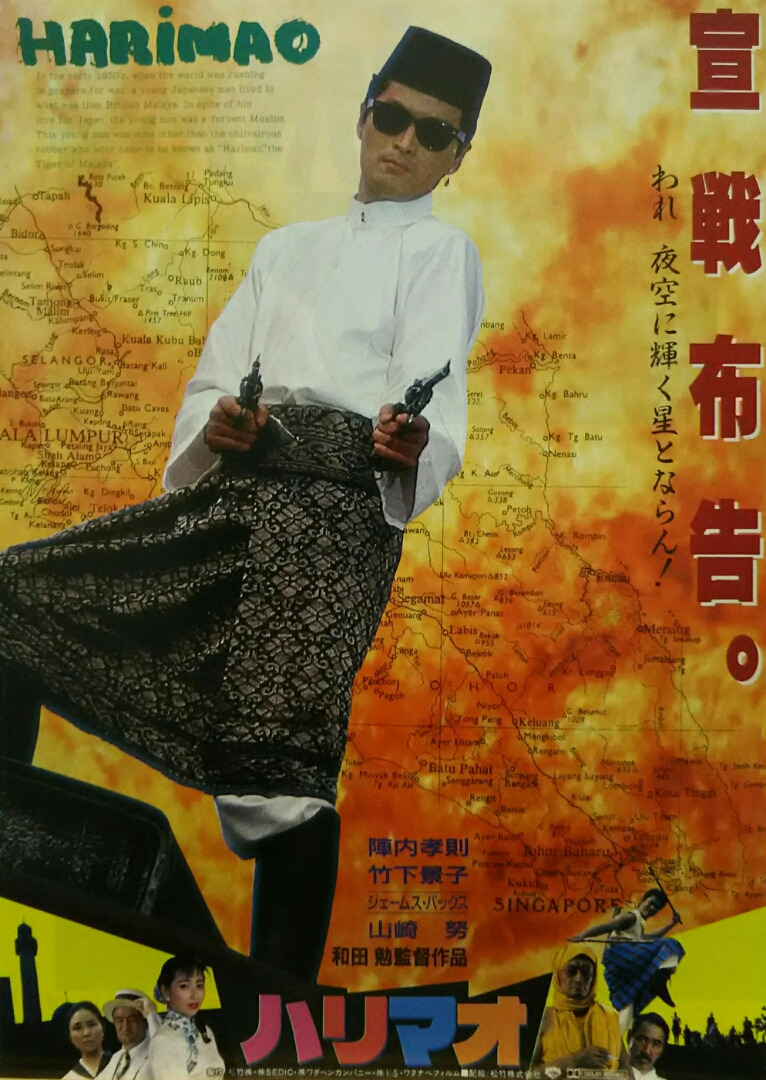
During the shooting of Tough Cops, there was a scene where my character jump from a chopper into the sea, but the stuntman doubling for me was doing it bad, so I complained to the director Eddie Rodriguez. I told him that if my stunt double couldn’t do it properly, then I would do it myself. The producer asked me to sign a letter that he would not be responsible if something happened to me. I signed. But when we shot the scene again, the bastards pilots tried to scare the shit out of me. Instead of taking off from the beach, they dove me over all the high mountains, while I was holding myself from the skies only with my hands. Luckily and thanks to my karate training, I was very strong. I guess I didn’t fall because it was not my time.
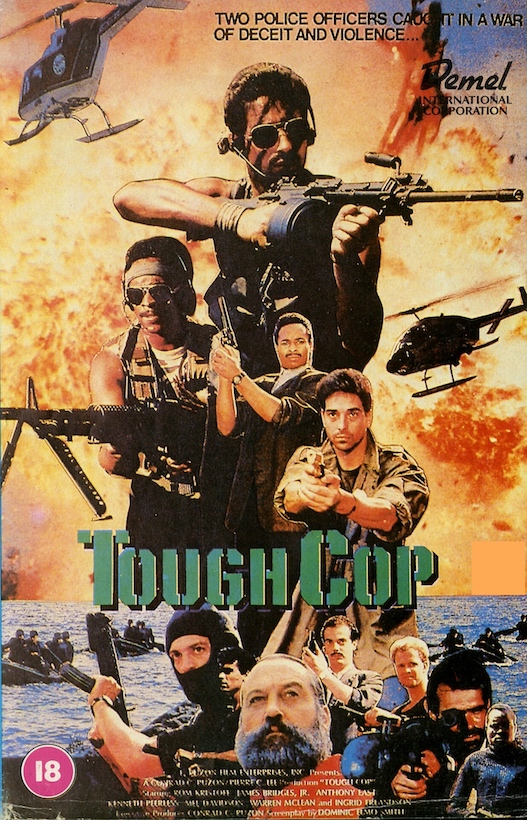
Richard Harrison, Bruce Baron and others told us some stunts gone wrong left them suffering permanently from back, hip or neck pain. You've never hurt yourself seriously?
Not really. Only once when we were shooting in North Korea the film Ultimate Mission. I had to do a stunt, jumping from a truck and landing on my back, on top of a couple of bags. But someone removed the bags, so I hit hard on the ground instead. A bit of pain but nothing serious. You know, I could tell you many other stories like these, but I'm afraid that would take a very long time! Every film was a challenge, especially those involving explosives and other pyrotechnic effects. I had burns and small injuries, but for me it was part of the job. We knew what we were getting into.
Speaking of Ten Zan: The Ultimate Mission, I read that originally, the Italians wanted to shoot a World War II movie set in Japan (« Ten Zan », called Devil's Peak by the American soldiers, refers to the last Japanese stronghold on the island of Iwo Jima). But apparently, the production was taken over by its North Korean investors, including none other than Kim Jong-il, who turned it into a commando movie with a vaguely sci-fi plot.
As far as I remember, Ferdinando Baldi wrote the story. Nino Milano, the production supervisor, met some Koreans at the Cannes Film Festival and they talked about shooting a film in North Korea, coproduced by Italy, the Filipino Cie Viva Films, and Kim Jong-il - the son of then-president Kim Il-sung, and father of today’s president Kim Jong-un. Kim Jong-il was a fanatic of filmmaking. He had built one of the biggest film studios in the world, with the replica of a street of Paris, one of London, of a US city, and a local native villa, big swimming pools with engines to create waves like the ocean etc. etc. I had the pleasure of meeting both Kim Il-sung and Kim Jong-il.
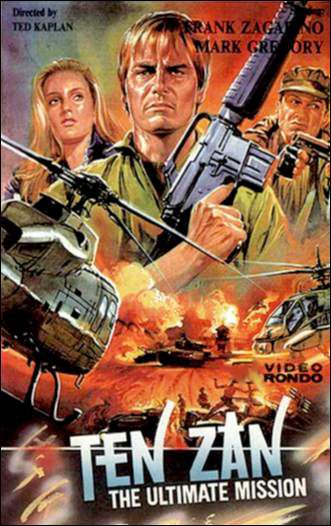 Ferdinando Baldi's "Missione Finale" (1988), shot in North Korea with the blessing of Kim Jong-il (!), with Romano Kristoff, Frank Zagarino, Sabrina Siani and Mark Gregory. More information about this film can be found in the books "North Korean Cinema: A History", from Johannes Schönherr (with an interview of Ferdinando Baldi) and "A Kim Jong-il Production” by Paul Fische.
Ferdinando Baldi's "Missione Finale" (1988), shot in North Korea with the blessing of Kim Jong-il (!), with Romano Kristoff, Frank Zagarino, Sabrina Siani and Mark Gregory. More information about this film can be found in the books "North Korean Cinema: A History", from Johannes Schönherr (with an interview of Ferdinando Baldi) and "A Kim Jong-il Production” by Paul Fische.
One of the actors, Charles Robert Jenkins (who played the evil scientist "Professor Larson" in the film), was in the United States Army until he defected in 1965 to North Korea, where he was held prisoner with three other American soldiers for 40 years. They were often used to play villain American characters in North Korean propaganda films. Jenkins told his story in a 2006 documentary called Crossing the Line.
From what I can recall, Charles was a very good actor and a very humble human being. I have to say I do have a great respect for the North Korean people. We were over there for about 7 months, between preparations and shooting, and they treated all of us with respect and friendliness. We stayed at the Koryo Hotel, the top hotel in Pyongyang at that time. I had a personal interpreter, Mr. Lee, a very kind and jovial person, and through him I met a lot of people, military and civilians, very hard working people, men and woman with a strong sense of pride and honor for their country. To all of them I want to say: thank you for your hospitality, your kindness and your patience, GAMSAHAMIDA.
According to Ferdinando Baldi, Frank Zagarino spent two days in a North Korean jail during filming, being suspected of being an American spy because he liked taking photos... [Zagarino denied in a 2012 interview, explaining only his camera was taken]
Oh, a similar story nearly happened to me. While shooting there, I met a French guy named Henri. He was teaching the Koreans how to make TV cartoons. We became friends and used to go every night to the only place you could meet other foreign people, mostly students from Guatemala and embassy people. The time for Henri to go back to France came, and that night we bought some Romani wine and celebrated his departure. The following week I was shooting at night, and after that week a general who was in charge of controlling our production called me at his office. « Who is your contact in Moscow? » he started. I said « what are you talking about? ». « I know you are a spy », he said, « you are working with Americans so now, tell me who is your contact in Moscow ». I said I didn’t know anybody in Russia. Then he showed me the telephone list: during the week I was shooting at night, every night at 8 o’clock someone called me from Russia. I could not believe it! Thanks to Kim Jong-il and the production people, they released me and let me go back with the rest of the Italians. Back in Manila maybe 6 or 8 months later, the phone rings. Hello? Hey Romano, it’s Henri, remember me? I am in Manila, can we meet tonight? Ok sure, I said. So we meet in a restaurant, having a happy dinner with wine and all, and then suddenly he says « You are a son of a bitch Romano, I was stuck in Moscow for a week, too much snow, planes couldn’t take off, so every night I tried to call you but you never answered the phone! » First I was stunned, and then I started to laugh. Because of Henri I could have ended in a North Korean prison for life! [Nanarland: This « Henri » character could very likely be Henri Rollin, who produced French cartoons which were finalized in the SEK Studio (North Korean animation studio in Pyongyang). There he notably worked on René Laloux’s animated film Gandahar (1987) and on the French TV cartoon Piff & Herkules (1989).]

We noticed you have a pretty good scar on your forehead. Did it happen while shooting a movie?
Not at all, this scar has been with me since I was 1 or 2 years old. We had a big mastiff dog, who was always taking care of me. But one day he bit me, no one knows why. My mom was in another room so she didn’t see it happen, she only realized when she heard me crying. Nothing to brag about!
You were appreciated by absolutely everybody we talked to. Even Bruce Baron, who could be a bitter character and have harsh words, had a lot of respect for you. Don Gordon said « Romano had great ability and potential with his looks for romantic leads and experience in combat for action. » They all said you were working hard at having a career, and had the potentiel to « go to the next level ». In your opinion, what might have prevented you to « go all the way » as an actor?
As I said before, when I had everything ready to go to Spain, and just a few months later my godfather in films died, and then my agent died, I was very disappointed. At the same time I also had some personal problems with my Filipina girlfriend, so I thought the time was not right for me. In fact I didn't really care anymore. But I don't live in the past, I like to live in the present. The past is gone, and the future has yet to come. Beside, I never really cared much for being famous anyway.

And do you think your Spanish accent could have put you at a disadvantage for some parts? Or were you dubbed after and the producers didn't care?
Some films were dubbed in Italy, others in the Philippines, and some were not dubbed, no one ever complained to me about it. Except some actors, but maybe they were just jealous. I am a simple person you know, and within my capabilities I always tried to help as many and as much as I could, and can.
According to the IMDB, your last film was Doomsdayer in 2000 (with Brigitte Nielsen & Joe Lara), do you confirm? What have you been doing since?
I am not sure, but it may be correct. After that I did direct a few episodes of a local TV show called Profiles. Then I went to Bahrain to do a documentary about Filipino domestic helpers in jail, and some documentaries for Japan. I left the Philippines in 2005 for South America, went to the Dominican Republic, Peru, Costa Rica, then Australia, Spain, Hong Kong... I worked with a friend of mine also doing a documentary about the oil company in North China. Then I went back to Hong Kong, where very dear friends of mine, Gordon Oldham and his wife Danielle who are like family to me, offered me a job in Bali for a year, and then to Thailand, working as their representative. Mr. Oldham is a famous lawyer in Hong Kong and chairman of the OLN law firm - where Robert Campbell also works as administrator - and he also owns The Pavilions, a chain of hotels and resorts in Europe, Thailand, Bali, Nepal, Mongolia and Japan. Now I am semi-retired, managing Mr. Oldham's tourist resort in Phuket, Thailand.
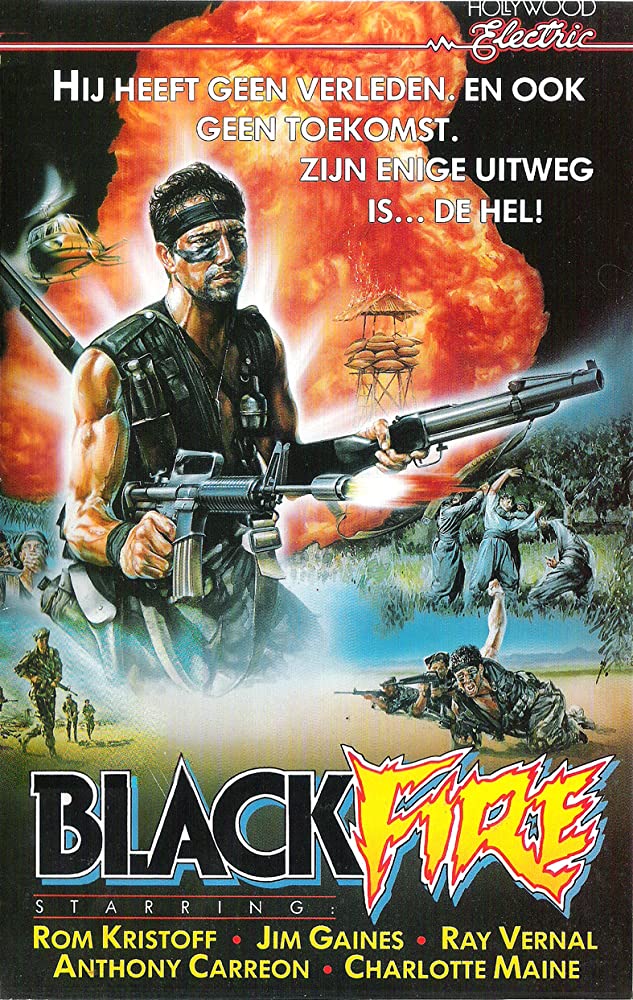
At some point, we heard you were « off to Uruguay to find part of Former President Marco's hidden fortune »! What was that about?
That is another story, which I can not talk about.
…Don Gordon Bell had warned us: « Mystery always surrounded my friend »! Thank you 1000 000 times for this interview Romano!!
I honestly want to thank you, Jesús Manuel, Andrew Leavold, and all the people who write about us actors who work in small budget films. From the bottom of my heart, THANK YOU.
